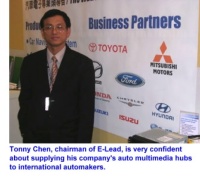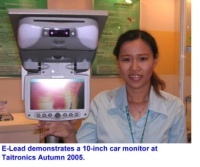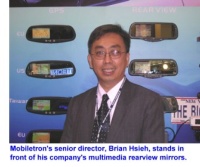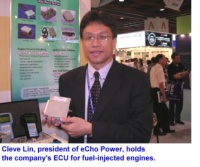Taiwan Actively Develops Automotive Electronics
Mar 22, 2006 Ι Industry News Ι Auto Parts and Accessories Ι By Quincy, CENS
As the world's top producer of information technology (IT) and electronics products, Taiwan surpasses global competitors in product design, innovation, manufacturing flexibility and cost control. But the slowdown in global personal computer (PC) demand and the increasingly competitive consumer electronics market have forced local manufacturers to rethink their future directions.
In this vein, perceptive companies in Taiwan see a bright future ahead in automotive electronics, because modern automobiles are increasingly equipped with electronics and information/communication technology (ICT) equipment.
This year's Taipei International Electronics Autumn Show (2005 Taitronics Autumn) set up a special zone dubbed the Car Electronics Pavilion, enticing several major companies to demonstrate their products and technologies. Next year the Pavilion is expected to expand greatly-a car electronics show may even be simultaneously held with the 2006 Taitronics.
In-car Multimedia
One leading automotive electronics maker in Taiwan at the pavilion was E-Lead Electronic Co., Ltd., the island's top supplier of hands-free cell-phone car kits and in-car multimedia systems. The company began its transition into the auto-electronics business in 2002 by focusing on vehicle multimedia and communications products; this year these products and navigation devices are expected to account for more than 80% of the firm's revenues.
Tonny Chen, E-Lead's chairman, says his company aims to become a globally leading maker of both original equipment/design manufacturing (OEM/ODM) products and its own "Sharperia" line of auto communication, navigation, and multimedia products.
"In the next few years, " Chen says, "E-Lead will concentrate on both the OE and pre-dealer install (PDI) markets, where we've already gained initial success supplying products to many international auto makers, large parts brands, and auto dealers worldwide."
According to Chen, several automakers in mainland China (including American and European car brands) have started adopting E-Lead's multimedia systems. In addition, the first Taiwan passenger car equipped with in-car multimedia systems designed and developed by E-Lead will hit the market soon. The new car, according to Chen, is a very important "world car" model.
E-Lead started cooperating with the local automaker three years ago, Chen says, and that success marked an important milestone for E-Lead because it will help the company enter the supply chains of local automakers' foreign technical partners.
"After the fierce competition in the past years, there are only few major players in car audio equipment left in the international market, " Chen says. "It is not so easy to supply OE (original equipment) in-auto multimedia systems to automakers. The threshold and technical requirements for OE suppliers are much higher than those for AM manufacturers. That's why many consumer electronic makers-even Sony-have not been able to successfully enter the OE in-car multimedia business."
The OE business centers not only on price, but also on quality control, product reliability and durability, timely shipment, quality certifications, and the most important, the automakers' trust, Chen explains. Auto multimedia systems supplied on an OE basis are often not the most technologically advanced units available, but they are the most reliable, with guaranteed long lifecycles. And simply demonstrating the ability to make reliable and durable OE products is not sufficient, because automakers require systems made to order, which requires long-term experience in automotive-electronics design. E-Lead earned its qualifications in this area from its long-term cooperation ties with automakers in making hands-free kits for cars.
"We think that now is the right time for E-Lead to tap the OE in-car multimedia business, " Chen says, "because all the world's major car makers are striving to cut costs and streamline their parts supplies for easier quality control." The chairman points out that E-Lead runs two plants in China and one in Taiwan, which also includes its R&D headquarters. Over the past few years, E-Lead has been phasing out its consumer-electronics business to concentrate on the automotive market."
As a first step in E-Lead's development plans, the company will strengthen its global competitiveness by providing dual interfaces for Bluetooth and non-Bluetooth products, and by modularizing its hands-free products. This will accommodate the interior designs of different car models, and will greatly reduce redevelopment costs for new products.
Recently, the company introduced the EL-820 top-end navigation/entertainment system, which has a 6.5-inch TFT-LCD monitor, GPS navigation, an interface for Bluetooth hands-free devices, and MP3, DVD, and digital-TV players.
In addition, E-Lead will continue to pursue cost advantages and quality that rivals that of leading global brands. To pursue this strategy the company has established a partnership with Sharp, for TFT-LCD panels; and with Sanyo, for DVD loaders.
The company also plans to become a major supplier of low-cost navigation systems. Using its strong technical, design, and system integration capabilities, E-Lead has reduced the cost of a GPS navigation system by 30% to 50%. The newly designed interface requires only three simple steps to retrieve navigation information, and flash memory cards (instead of the previous DVD player-based system) store electronic-map data.
Mobiletron's Easy-go Mirror
Another successful example of Taiwan's automotive electronics sector is Mobiletron Electronics Co., which is listed on the Taiwan Stock Exchange and is a leading maker of both electric hand tools and auto electronics parts. The company aims to integrate optoelectronic and electrical equipment in its"Easy-go" multimedia rearview mirror.
The company's mirror is targeted at cars that have OE stereo systems and drivers who want GPS navigation and reversing safety.
The Easy-go mirror is now in its third generation, and acts like a multimedia platform with a number of functions. A four-inch liquid crystal display (LCD) screen and a set of hi-fi speakers are built in, and a special surface coating allows the Easy-go to serve as both a mirror and an information-display center. It can display images transmitted by a charge-coupled-device (CCD) camera mounted at the front or rear of the car, a DVD or VCD player, an in-car camera to keep watch on a baby in the rear seat or goods in the trunk, or a global positioning system (GPS) receiver. The mirror's display is controlled by a hands-free unit.
The mirror's functions can be expanded with wide-angle cameras, night-vision cameras, image recording (with a digital video recorder) that can supply evidence in case of an accident or crime, a tire-pressure monitoring system using wireless (TPMS) sensors in the tires, and an electronic compass. Mobiletron's ultimate goal is to offer a mirror that serves as a multimedia platform and replaces all in-car entertainment, security, and navigation devices.
Mobiletron's senior director, Brian Hsieh, reports that his company developed the first generation of its mirror in 2002 with only one function: a reversing image. The effort to expand the mirror's functions is ongoing, and U.S and European GPS navigation versions of the device are expected soon.
To develop the multimedia platform, Mobiletron set up wholly owned Mobiletron Optoelectronics, which produces CCD cameras that are water- and shockproof; and Asia Pacific Microsystems Inc., a maker of TPMS products.
"The multimedia rearview mirror business is expanding rapidly because it offers the advantages of easy installation, adequate display size, low cost, and high compatibility with other A/V applications, " Hsieh comments. "Mobiletron's advantages in this business lie mainly in our in-house production of CCD cameras (which keeps costs down), QS9000 quality certification, auto-electronics experience, established worldwide sales channels and service bases, and competitive prices."
ECU
Another company demonstrating Taiwan's strong potential in automotive electronics is eCho Power System Co., Ltd., a company spun off by Taiwan's Industrial Technology Research Institute (ITRI).
Echo Power makes engine control units (ECUs) for one- to four-cylinder motors. The ECU is a key part for fuel injected engine management systems (EMS) in powered two-wheeler (PTW) and automotive engines.
According to Cleve Lin, president of eCho Power, ITRI began cooperating with Delphi of the United States about four years ago to develop the first EMS for fuel-injected PTW engines. However, because Delphi is the world's largest auto-parts supplier, Lin explains, that company is too big to be flexible and cost-competitive in the small-engine EMS market. As a result, Delphi decided to cooperate with ITRI, and released some key technologies to the Taiwanese partner with the goal of building cost-competitive small-engine ECUs, Lin says.
Generally speaking, Lin says, PTW engine technology trails that in autos by about five to 10 years. For example, fuel injection has been adopted on almost all new autos, but is used in less than 1% of new PTWs.
That generates big business opportunities for Echo, Lin stresses, because when more stringent emission regulations become effective, such as the new European Union (EU) E3 directive, traditional carbureted engines will find it difficult to meet the low emission levels. "The global fuel injected PTW market is expected to witness a 500% to 1, 000% annual growth after 2006 or 2007, " Lin says. "India, for example, will be a huge market."
"eCho Power has drawn up a clear roadmap for our future development, " Lin points out. "The company will focus on upgrading the safety and performance of vehicles, rather than on more IT- and consumer electronics-oriented products. First, we will focus on the design and development of ECUs for fuel-injected engines, and supply them to major international parts makers. Then we will develop motor, transmission, vehicle, and battery controls for hybrid-engine vehicles." (October 2005)
In this vein, perceptive companies in Taiwan see a bright future ahead in automotive electronics, because modern automobiles are increasingly equipped with electronics and information/communication technology (ICT) equipment.
This year's Taipei International Electronics Autumn Show (2005 Taitronics Autumn) set up a special zone dubbed the Car Electronics Pavilion, enticing several major companies to demonstrate their products and technologies. Next year the Pavilion is expected to expand greatly-a car electronics show may even be simultaneously held with the 2006 Taitronics.
In-car Multimedia
One leading automotive electronics maker in Taiwan at the pavilion was E-Lead Electronic Co., Ltd., the island's top supplier of hands-free cell-phone car kits and in-car multimedia systems. The company began its transition into the auto-electronics business in 2002 by focusing on vehicle multimedia and communications products; this year these products and navigation devices are expected to account for more than 80% of the firm's revenues.
Tonny Chen, E-Lead's chairman, says his company aims to become a globally leading maker of both original equipment/design manufacturing (OEM/ODM) products and its own "Sharperia" line of auto communication, navigation, and multimedia products.
"In the next few years, " Chen says, "E-Lead will concentrate on both the OE and pre-dealer install (PDI) markets, where we've already gained initial success supplying products to many international auto makers, large parts brands, and auto dealers worldwide."
According to Chen, several automakers in mainland China (including American and European car brands) have started adopting E-Lead's multimedia systems. In addition, the first Taiwan passenger car equipped with in-car multimedia systems designed and developed by E-Lead will hit the market soon. The new car, according to Chen, is a very important "world car" model.
E-Lead started cooperating with the local automaker three years ago, Chen says, and that success marked an important milestone for E-Lead because it will help the company enter the supply chains of local automakers' foreign technical partners.
"After the fierce competition in the past years, there are only few major players in car audio equipment left in the international market, " Chen says. "It is not so easy to supply OE (original equipment) in-auto multimedia systems to automakers. The threshold and technical requirements for OE suppliers are much higher than those for AM manufacturers. That's why many consumer electronic makers-even Sony-have not been able to successfully enter the OE in-car multimedia business."
The OE business centers not only on price, but also on quality control, product reliability and durability, timely shipment, quality certifications, and the most important, the automakers' trust, Chen explains. Auto multimedia systems supplied on an OE basis are often not the most technologically advanced units available, but they are the most reliable, with guaranteed long lifecycles. And simply demonstrating the ability to make reliable and durable OE products is not sufficient, because automakers require systems made to order, which requires long-term experience in automotive-electronics design. E-Lead earned its qualifications in this area from its long-term cooperation ties with automakers in making hands-free kits for cars.
"We think that now is the right time for E-Lead to tap the OE in-car multimedia business, " Chen says, "because all the world's major car makers are striving to cut costs and streamline their parts supplies for easier quality control." The chairman points out that E-Lead runs two plants in China and one in Taiwan, which also includes its R&D headquarters. Over the past few years, E-Lead has been phasing out its consumer-electronics business to concentrate on the automotive market."
As a first step in E-Lead's development plans, the company will strengthen its global competitiveness by providing dual interfaces for Bluetooth and non-Bluetooth products, and by modularizing its hands-free products. This will accommodate the interior designs of different car models, and will greatly reduce redevelopment costs for new products.
Recently, the company introduced the EL-820 top-end navigation/entertainment system, which has a 6.5-inch TFT-LCD monitor, GPS navigation, an interface for Bluetooth hands-free devices, and MP3, DVD, and digital-TV players.
In addition, E-Lead will continue to pursue cost advantages and quality that rivals that of leading global brands. To pursue this strategy the company has established a partnership with Sharp, for TFT-LCD panels; and with Sanyo, for DVD loaders.
The company also plans to become a major supplier of low-cost navigation systems. Using its strong technical, design, and system integration capabilities, E-Lead has reduced the cost of a GPS navigation system by 30% to 50%. The newly designed interface requires only three simple steps to retrieve navigation information, and flash memory cards (instead of the previous DVD player-based system) store electronic-map data.
Mobiletron's Easy-go Mirror
Another successful example of Taiwan's automotive electronics sector is Mobiletron Electronics Co., which is listed on the Taiwan Stock Exchange and is a leading maker of both electric hand tools and auto electronics parts. The company aims to integrate optoelectronic and electrical equipment in its"Easy-go" multimedia rearview mirror.
The company's mirror is targeted at cars that have OE stereo systems and drivers who want GPS navigation and reversing safety.
The Easy-go mirror is now in its third generation, and acts like a multimedia platform with a number of functions. A four-inch liquid crystal display (LCD) screen and a set of hi-fi speakers are built in, and a special surface coating allows the Easy-go to serve as both a mirror and an information-display center. It can display images transmitted by a charge-coupled-device (CCD) camera mounted at the front or rear of the car, a DVD or VCD player, an in-car camera to keep watch on a baby in the rear seat or goods in the trunk, or a global positioning system (GPS) receiver. The mirror's display is controlled by a hands-free unit.
The mirror's functions can be expanded with wide-angle cameras, night-vision cameras, image recording (with a digital video recorder) that can supply evidence in case of an accident or crime, a tire-pressure monitoring system using wireless (TPMS) sensors in the tires, and an electronic compass. Mobiletron's ultimate goal is to offer a mirror that serves as a multimedia platform and replaces all in-car entertainment, security, and navigation devices.
Mobiletron's senior director, Brian Hsieh, reports that his company developed the first generation of its mirror in 2002 with only one function: a reversing image. The effort to expand the mirror's functions is ongoing, and U.S and European GPS navigation versions of the device are expected soon.
To develop the multimedia platform, Mobiletron set up wholly owned Mobiletron Optoelectronics, which produces CCD cameras that are water- and shockproof; and Asia Pacific Microsystems Inc., a maker of TPMS products.
"The multimedia rearview mirror business is expanding rapidly because it offers the advantages of easy installation, adequate display size, low cost, and high compatibility with other A/V applications, " Hsieh comments. "Mobiletron's advantages in this business lie mainly in our in-house production of CCD cameras (which keeps costs down), QS9000 quality certification, auto-electronics experience, established worldwide sales channels and service bases, and competitive prices."
ECU
Another company demonstrating Taiwan's strong potential in automotive electronics is eCho Power System Co., Ltd., a company spun off by Taiwan's Industrial Technology Research Institute (ITRI).
Echo Power makes engine control units (ECUs) for one- to four-cylinder motors. The ECU is a key part for fuel injected engine management systems (EMS) in powered two-wheeler (PTW) and automotive engines.
According to Cleve Lin, president of eCho Power, ITRI began cooperating with Delphi of the United States about four years ago to develop the first EMS for fuel-injected PTW engines. However, because Delphi is the world's largest auto-parts supplier, Lin explains, that company is too big to be flexible and cost-competitive in the small-engine EMS market. As a result, Delphi decided to cooperate with ITRI, and released some key technologies to the Taiwanese partner with the goal of building cost-competitive small-engine ECUs, Lin says.
Generally speaking, Lin says, PTW engine technology trails that in autos by about five to 10 years. For example, fuel injection has been adopted on almost all new autos, but is used in less than 1% of new PTWs.
That generates big business opportunities for Echo, Lin stresses, because when more stringent emission regulations become effective, such as the new European Union (EU) E3 directive, traditional carbureted engines will find it difficult to meet the low emission levels. "The global fuel injected PTW market is expected to witness a 500% to 1, 000% annual growth after 2006 or 2007, " Lin says. "India, for example, will be a huge market."
"eCho Power has drawn up a clear roadmap for our future development, " Lin points out. "The company will focus on upgrading the safety and performance of vehicles, rather than on more IT- and consumer electronics-oriented products. First, we will focus on the design and development of ECUs for fuel-injected engines, and supply them to major international parts makers. Then we will develop motor, transmission, vehicle, and battery controls for hybrid-engine vehicles." (October 2005)
©1995-2006 Copyright China Economic News Service All Rights Reserved.









